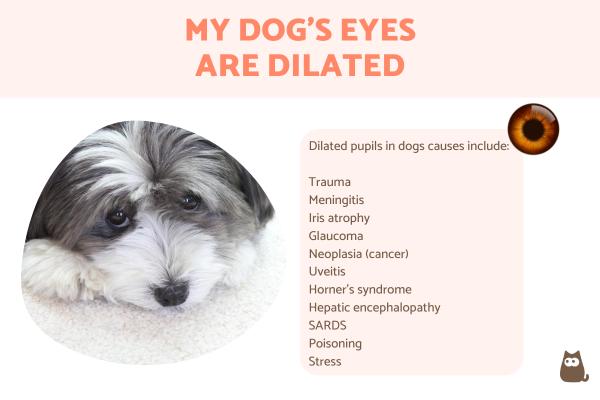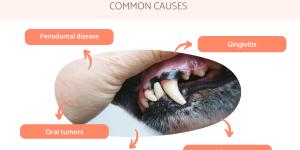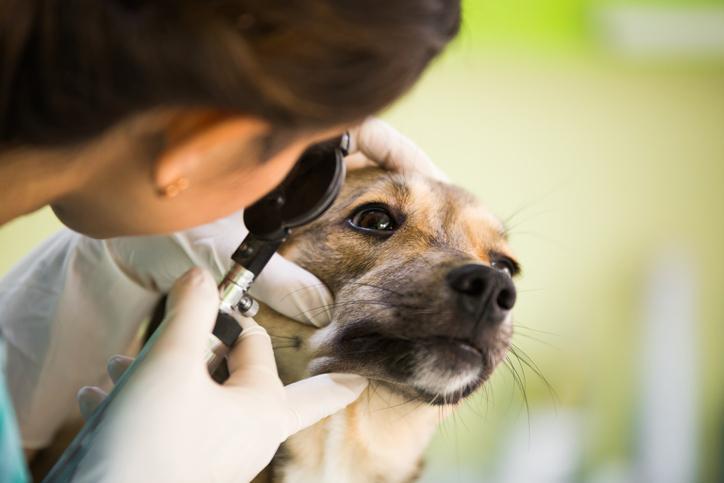My Dog's Eyes Are Dilated



See files for Dogs
Dilated pupils in dogs, especially in bright light or if affecting only one eye, can be a cause for concern. If you notice that your dog's pupils become unusually enlarged, it is always best to seek veterinary attention. There are multiple reasons that can explain the pathological dilation of pupils in dogs. Some are physiological, such as related to injury or canine eye conditions. Others indicate a psychological or emotional issue.
In this AnimalWised article we ask why are my dog's eyes are dilated, discussing related symptoms and the causes that can be inferred from them. Remember that you must consult a veterinarian to establish a proper diagnosis, treatment and referral to an ethologist or behavior specialist, if applicable.
Causes for dilated pupils in dogs
In a dog's eye, the pupil is the round opening at the center of the iris. This is a muscular membrane that opens and closes. Working like a camera aperture, it regulates the amount of light that hits the retina. Light reaches the retina is transformed into electrical impulses with the help of photoreceptor cells. These impulses reach the brain via the optic nerve, allowing the dog to process what is sees.
Dog pupils are large in size compared to human pupils, and provide a wide visual range. This especially allows them to see moving objects effectively. If a dog's eyes are dilated, it does not necessarily signify a problem. Pupils naturally dilate to allow more light to enter. A good example is at dusk or under dim lights.
We should take into account the context of the dilated pupils. If the dog's pupils are open wide due to low-light conditions, they should return to normal once they return to a brighter environment. In these cases, the dilation is temporary. If your dog has dilated pupils in bright light here are the possible reasons:
- Heightened emotions
- Disease or injury
- At the time of death
Pupil dilation is also called mydriasis and can be unilateral or bilateral, meaning it affects one eye or both, respectively. Normal pupils are symmetrical and dilate and contract together depending on the amount of light. If you dog has one pupil smaller than the other, this indicates a problem.
My dog has only one dilated pupil - anisocoria in dogs
Asymmetrical pupil dilation in dogs is known clinically as anisocoria. It may indicate a brain injury or infection such as meningitis, health issues which usually have a poor prognosis. If you notice this symptom it is crucial to go to the veterinarian. If a dog has only one dilated pupil, this can give the vet clues about the possible cause.
Apart from head trauma, anisocoria in dogs may be caused other traumas such as a cervical spine injury. This may be the result an accident, for example if the dog suffers a heavy blow or fall from a great height.
When assessing the origin and characteristics neurological disorders and injuries, the vet will need to thoroughly examine the dog, performing a neurological exam and using appropriate diagnostic imaging techniques. The prognosis is reserved. In serious cases, the dog may die. When there is head trauma involved, anisocoria is a veterinary emergency and should be treated at once.
Sometimes, the cause of a dog's dilated pupil is in the eye itself. This may be caused by degenerative, infectious or other disorders in the eye. Here are some of the other possible causes of anisocoria in dogs presenting with unilateral mydriasis:
- Iris atrophy
- Glaucoma
- Neoplasia (cancer)
Asymmetrical pupil size in a dog may also be due miosis, i.e. one pupil contracting rather than dilating. Anisocoria in such cases could be due to uveitis, Horner's syndrome, retinal infection or hepatic encephalopathy, among other disorders. It is very important to consult the vet to get a proper diagnosis of the underlying cause and appropriate treatment for your dog.
Learn more about the causes and treatment of glaucoma in dogs with our related guide.

My dog’s pupils are always dilated
If the dog has both pupils dilated and does not see well, it is possible that they are suffering from SARDS (sudden acquired retinal degeneration syndrome). This is a disease that damages the retina and causes the sudden onset of permanent blindness. Bilateral mydriasis, or the enlargement of both pupils, is one of the first symptoms of this condition.
A retinal detachment can also be the cause of sudden blindness in dogs. Both cases will require consultation with a veterinarian specializing in ophthalmology, to assess possible treatment options.
For more information on blindness in dogs, consult this article where we explain how to know if your dog is blind.

My dog has dilated pupils and is shaking
If your dog has dilated pupils and is trembling or shaking, it may be due to one of the following:
Dilated pupils in dogs due to poisoning
Usually, the most common symptoms of poisoning in dogs are seizures and hypersalivation. However, occasionally, dilated pupils can also be causes by poisoning. For example, ivermectin toxicity causes dilated pupils, tremors, lack of coordination, vomiting, and sometimes blindness. Some breeds, such as the Border Collie, are genetically sensitive to this drug. Dog poisoning is considered a veterinary emergency.
Dilated pupils in dogs of psychological origin
Other times, dilated pupils do not indicate a psychological problem rather than a physical one. A dog's body language changes when they are suffering from anxiety or stress or experiencing intense fear. This often includes pupil dilation. A dog experiencing phobia may also shake or tremble, show breathing difficulty, hypersalivation and incontinence, among other symptoms.
Another psychological disorder that can cause dilated pupils in dogs along with trembling is obsessive compulsive disorder or OCD. Compulsive behaviors in dogs include constantly chasing their tail, compulsively licking the same place in the body and hallucinatory behaviors. In addition, the dog may present physiological symptoms such as tachycardia, pupil dilation, anorexia or diarrhea.
Before diagnosing a psychological problem in a dog, the veterinarian will rule out physical causes of pupil dilation and other symptoms. Once a psychological diagnosis is confirmed, treatment should be left to canine behavior experts such as ethologists.

This article is purely informative. AnimalWised does not have the authority to prescribe any veterinary treatment or create a diagnosis. We invite you to take your pet to the veterinarian if they are suffering from any condition or pain.
If you want to read similar articles to My Dog's Eyes Are Dilated, we recommend you visit our Other health problems category.
- Alvarez, R. (2017). Managing the fear of fireworks in dogs and cats. Revista Ateuves, 68:27.
https://ateuves.es/ceva-comportamiento-gestionar-el-miedo-a-los-petardos/ - Carlson, L. D., & Giffin, J. M. (2002). Dog Owner's Home Veterinary Handbook. John Wiley & Sons.
- Díaz, M. G. (2017). Compulsive disorders in dogs and cats. Revista Ateuves, 58, 22-24.
https://ateuves.es/trastornos-compulsivos-perros-gatos/ - Esteban, J. R., Ángeles , M., & Tovar, M. C. (2013). The most frequent disorders of the ocular fundus. Retrieved 27 December, 2019
https://www.portalveterinaria.com/articoli/articulos/23539/alteraciones-mas-frecuentes-del-fondo-ocular.html - Heller, H. B., & Bentley, E. (2016). The practitioner’s guide to neurologic causes of canine anisocoria. Today's Veterinary Practice, 6(1), 77-83.
https://todaysveterinarypractice.com/observations-ophthalmologythe-practitioners-guide-neurologic-causes-canine-anisocoria/







